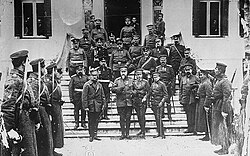| This article includes a list of general references, but it lacks sufficient corresponding inline citations. Please help to improve this article by introducing more precise citations. (September 2014) (Learn how and when to remove this message) |
| Events leading to World War I |
|---|
 |
|
The Pig War (Serbian: Свињски рат, romanized: Svinjski rat, German: Schweinekrieg, Hungarian: Disznóháború), or Customs War (Царински рат/Carinski rat), was a trade war between Austria-Hungary and the Kingdom of Serbia in 1906 to 1908 during which the Habsburgs unsuccessfully imposed a customs blockade on Serbian pork.
Background
In the early 20th century, Serbia was economically a satellite of the Habsburgs, its major export being pork, most of which was bought by Austria-Hungary. When Serbia started trying to evade economic and political control by the Habsburgs and to build links with other countries, particularly Bulgaria, Germany and France, the Hungarian government decided to punish the Serbs with economic sanctions. Specifically, in an attempt to reduce its economic dependence on Austria-Hungary, Serbia began to import French, rather than Austro-Hungarian, munitions and established a commercial treaty with Germany in 1904 and a customs union with Bulgaria in 1905 that ended the sale of tariff-laden Austrian goods in Serbia.
History
Long used to setting economic policy, Austria-Hungary responded in April 1906 by closing its borders to Serbian pork. Serbia refused to bow to Vienna, gained French investment to build new packing plants for international trade, began to order materials from the Austro-Hungarian rival Germany and pressured the Austrian-administered provinces of Bosnia and Herzegovina for a trade outlet on the Adriatic Sea. That caused Austria-Hungary to concede the conflict by March 1908, as can be shown by the trade statistics of the period in question:
| Foreign Trade of the Kingdom of Serbia EB1911 page 688 | |||||||||
|---|---|---|---|---|---|---|---|---|---|
| 1904 | 1905 | 1906 | 1907 | 1908 | |||||
| Exports (thousand GBP): | 2,486 | 2,879 | 2,864 | 3,259 | 3,019 | ||||
| Imports (thousand GBP): | 2,437 | 2,224 | 1,773 | 2,823 | 3,025 | ||||
| Trade Balance (thousand GBP): | 49 | 655 | 1,091 | 436 | -6 | ||||
| Exports/Imports (%): Rounded to the nearest % |
102 | 129 | 162 | 115 | 100 | ||||
See also
References
- ^ Clark, Christopher M. (2012). The Sleepwalkers : How Europe Went to War in 1914. London: Allen Lane. ISBN 978-0-7139-9942-6. OCLC 794136314.
- Chisholm, Hugh, ed. (1911). "Servia" . Encyclopædia Britannica. Vol. 24 (11th ed.). Cambridge University Press. pp. 686–698, see page 688.
Commerce
- Misha Glenny, The Balkans 1804-1999: Nationalism, War and the Great Powers (London: Granta, 1999), pp. 281–2.
- 1900s in Serbia
- Pork
- Causes of World War I
- Economy of Austria-Hungary
- Economy of the Kingdom of Serbia
- Economy of the Russian Empire
- Trade wars
- Austria-Hungary–Serbia relations
- 1906 in Austria-Hungary
- 1907 in Austria-Hungary
- 1908 in Austria-Hungary
- 1906 in Serbia
- 1907 in Serbia
- 1908 in Serbia
- Serbia under Habsburg rule